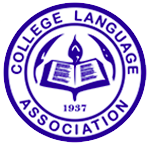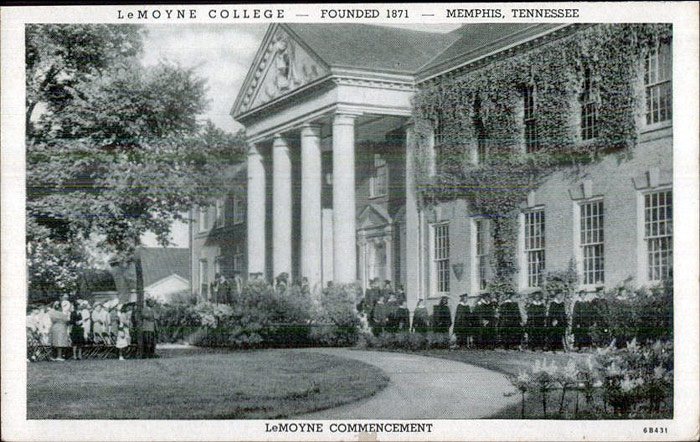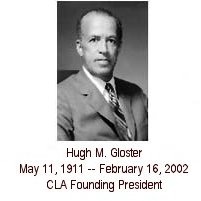
THE COLLEGE LANGUAGE ASSOCIATION
HISTORY

LeMoyne College, where CLA was founded (courtesy of Historic Memphis)
According to the historical notes provided in the College Language Association archives housed at the Atlanta University Center Robert W. Woodruff Library, "In 1937, a LeMoyne College professor named Hugh M. Gloster, through correspondence with Gladstone Lewis Chandler, a colleague at Morehouse College, discussed" the need for stronger critical thinking and English language education for students at their respective colleges. Gloster therefore "engaged other English teachers at predominately private 'Negro' colleges and universities to form an association which would address the problem from its origins to its current state. In 1937, eight men and women met at LeMoyne and formed the Association of Teachers of English in Negro Colleges (ATENC)."
CLA Founding President, Dr. Hugh Morris Gloster

In 1937 Dr. Hugh Morris Gloster, along with nine other scholars from historically black colleges and universities, was the Founder of the College Language Association (CLA) at LeMoyne College in Memphis, Tennessee. Moreover, he was the first president of this distinguished organization (1937-38) and he served a second term (1948-50) during the post-World War II era.
Dr. Gloster was born and reared in Brownsville, Tennessee. He received a B.A. degree from Morehouse College (1931), an M.A. from Atlanta University (1933), and a Ph.D. in English from New York University (1943). In addition, he was the recipient of the CLA President’s Award (1997), the honorary degree of Doctor of Humane Letters, and a Lifetime Achievement Award at Hampton University (1999). Dr. Gloster was a prominent educator, scholar and world traveler whose most well-known work was Negro Voices in American Fiction (1948). Before he retired from Morehouse College, Dr. Gloster was named by his peers as one of the 100 best college presidents in the nation. In addition, he served as a member of the Morehouse College Board of Trustees until his death. Articles by several CLA scholars about Dr. Gloster’s contributions to higher education and to the CLA can be found in The Chronicle of Higher Education (July 22, 1987), Call and Response: The Riverside Anthology of the African American Literary Tradition (1998), as well as The Encyclopedia of Black America (1988).
As the archives aptly remind us, "In 1941, the Association broadened its objective to formally include the teaching of literature and foreign language, thus changing its name to the Association of Teachers of Languages in Negro Colleges (ATLNC). In 1949, the ATLNC officially became the College Language Association (CLA)."
Marie H. Buncombe, CLA President (1986-1988), expands upon this rich history and the overwhelming significance of the Association in her 1987 presidential address entitled, "Legacy from the Past, Agenda for the Future: The College Language Association, 1937-1987," at the CLA Convention in Washington, D.C. "In reflecting history and recording it," she writes, "CLA has been making history for half a century. In salute, let us proudly lift the torch, keep it lit, and pass it on" (50).
"Legacy from the Past, Agenda for the Future"
Marie H. Buncombe
Carolyn Fowler also attributes great value to the College Language Association in paving the way for today's educators and scholars. In her 1988 dissertation, "The College Language Association: A Social History," she explores the social landscape of CLA, relying upon extensive interviews and oral histories in order to help record the story of one of America's most important and long-standing African-American academic associations.
"The College Language Association: A Social History"
Carolyn Fowler
|